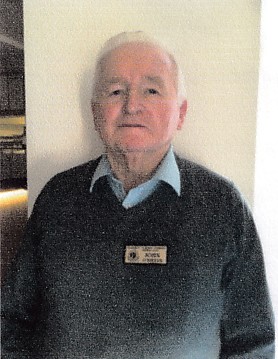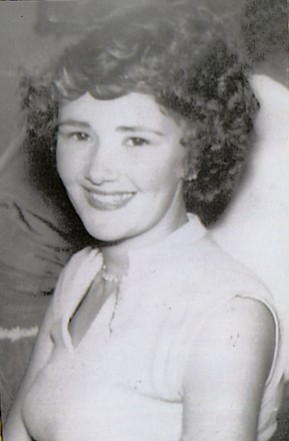MEMBER’S PROFILE
John OAM

Born in 1939. Grew up on dairy farm “Allawah” Swamp Road Dunmore.
Moved to Barrack Heights in 1974.
Sporting Administrator (particularly rugby league and cricket) including 40 years as Secretary of group 7 Rugby League.
Alderman/Councilor of Shellharbour Municipal then City Council 1968-86 including two terms as Mayor.
Received Order of Australia Medal (OAM) in 1991 for service to sport and the community. Sporting Oval named in my honour at Croome Complex Albion Park 1987.
Executive positions held in Rugby League, Cricket, Academy of Sport, Saint Vincent De Paul, Heritage society, Sports Star of the Year, Catholic Church, Irish /club, Order of Australia Association, Probus and others.
Correspondent for local newspaper and wrote a sporting column in Kiama Independent/Lake Times for almost thirty years. Life member of thirteen organisations.
Sporting highlight. Sitting with Sir Donald and Lady Bradman at the Bicentennial Cricket Test in Sydney in 1988. Always followed the motto “never forget the people who came before you”.

Carole
I was born in Broken Hill. My father worked for the GPO. He was transferred back to Sydney when I was 2. He was a telegraphist and used Morse Code which was considered an essential service in those days during the war. He taught me how to use it.
The reason I put my hand up to be the Bulletin Editor is because of two words that were said while I was sitting at the first meeting. The first was “Editor” and the lady sitting behind me said “You have to be able to type to do that”. Both were a part of my very first job when I turned 15. Norma Gibson was sitting beside me and said “Put your hand down!” So, I decided to use the first photo taken of me when I worked for Consolidated Press. A photographer walked into my office and said “Smile Carole” and left
I worked in the Competition Department and our job was to go through every entry until we got the winners. I worked in Pier Street Ultimo and the head office was the building in Castlereagh Street which housed The Daily and Sunday Telegraph and the Women’s Weekly. The CEO at that time was Frank Packer. His two sons Kerry and Clyde Packer worked with him.
Fortunately, the man in charge of the Competition Department was John O’Donnell, a perfect gentleman. Frank Packer would fire a copy boy just for whistling in the corridor.
The biggest competition we had was called Teleword. It ran weekly and every Friday night we would get Reporters, Journalists, and other staff members from the Telegraph to help finish off the Competition as the result had to be in the Saturday Telegraph. It was worth winning.
Frank Packer would come every Friday night with his sons because he had the winning word, he didn’t trust anyone else.
They would hire casual workers (Women) to help through all the major competitions. I had just lost my mother but I ended up with about 20 mothers as they would all give me advice and a lot of love.
Channel 9 used our office space when it first started while they were waiting for their building at Willoughby. So, there was more typing to be done. My shorthand went out the window because when they wanted a message sent, the guys would just stand behind me while I typed it up on copy paper. The person who would give me the most typing to do was Bruce Gyngell, the man who you would have seen as he was the first person on TV saying “Welcome to Australian Television” Manual typewriters were in use as well as the Sylvester Switchboard.
After I was married and had my family I went to work for the Department of Education as a Library clerical in two High Schools for the next 25 years. This is where the technology began to change. The electric typewriter came in as did the photo copier. We just got used to them when the computers arrived. Major changes. We never had to type up any more library cards, the information all went on computers which the students could access themselves. No more switchboards just ordinary phone. Now of course I have had to keep up learning how to use the new computer systems. iPad, printers, mobile phones, emails. Now if I need any help I just call my granddaughter, Kate, and she comes to show me what to do!
It has been a great journey and I have enjoyed every minute from day one starting at Consolidated Press to being your Bulletin Editor.
Ian
I am fortunate to have lived through a wonderful period in Australia. As a child I used to wander all over Bondi climbing down cliffs (unbeknown to my mother) stole golf balls from the fairways on Bondi Golf club caddied for obscene money at Royal Sydney and of course learned to body surf. At four years old my mother was sick so I was left in my aunties care and was such a handful that she enrolled me in the local school (the building is still there) telling the staff that she didn’t know how old I was . We moved from Bondi to Bexley and from the public school there I was sent to Hurstville opportunity school and from there invited to go to Sydney Boys High and from there earned a scholarship to Sydney University
Upon graduation I went to work for my father in a manufacturing business making metal toys (trucks and bulldozers etc) as well as components for the car industry. When that company closed I went to work for various divisions of Repco and worked (against my wishes) to close down 4 of Repco's manufacturing divisions (switches, car mufflers, batteries and car air-conditioning). I then went into partnership with three other managers in an air conditioning company until the then Prime minister gave the country the depression we had to have which sent the company broke (in this day and age it is salutary to note that the interest rate on our borrowings was 28%). I then ended up doing numerical control programming for a machining company in Sutherland mainly making parts for Joy manufacturing who were making some of the most advanced coal mining machines in the world until they were taken over by their American competitor and closed down
At 8 years old I joined the cubs and went through scouts to become a ranger. To this day I still believe that the scouting organization is one of the best ways to train young people in self reliance and leadership. I learned chess from my father and played it a high school and became further involved in an amateur way at Uni playing many games with Fred Flatow who beat me most of the time as he played from the “book” a large manual of all possible moves in chess for the first 30 moves. He went on to become chess champion for NSW. I remember at Uni we all discussed the possibility of computers playing chess and we all agreed that it would be 100 years before computers could beat a skillful player let alone a grandmaster HA HA. I restored my confidence after graduation by becoming chess champion for the Sharks Leagues club.
My father enjoyed golf so of course I was taught golf and have continued to enjoy it even now. In our early teens our family were one of the first to start caravanning around the east coast of Australia for our holidays with friends and many a time we would park overnight by the side of the road (can you believe that) and the adults would play 18 holes of hole whilst the kids would wander onto the golf course with 3 clubs each and play in a group of 8 down the deserted fairways
I was a member of Caringbah Rotary for many years and am a foundation member of Burraneer Probus and also Shell Cove Probus. I coached my sons soccer team from the under 8’s through to the over 21’s at which stage I was just the beer carrier. I have had the great honor to be married to a wonderful lady who has given me 4 precious children all of whom I love dearly but I will leave their story for Lyn to tell when she gets around to her amazing life
As a last statement I have also enjoyed sailing and have done over 23000 miles on the ocean but that is something for another day

 ®
®